Enrique Dans
Information Systems researcher and lecturer
IE Business School
Madrid - SpainTechnical
Enrique Dans was born in A Coruña, Spain, on 14 May 1965. His grandfather was a professional insurance broker from a small village in the northwestern region of Galicia. He completed a degree in Biology at the University of Santiago de Compostela and a PhD in Management, specialising in information systems, at UCLA’s John E. Anderson Graduate School of Management. He pursued postdoctoral studies at Harvard Business School and obtained an MBA from IE Business School in Madrid. Since 1990 he has been a lecturer on Information Systems at IE Business School in Madrid. In his role as a technology researcher, adviser and general guru, he studies its effects on businesses, individuals and society at large. In addition to his teaching and knowledge spreading work, he provides advisory services to a number of startups and established organisations. He is a regular contributor to newspapers and magazines including El País, El Mundo, ABC, Público, Expansión, Cinco Días, Libertad Digital and PC Actual.
He runs a personal blog which he started in 2003 and has his own name: enriquedans.com. In 2006 he was shortlisted for the BOB awards in the best Spanish language blog category, and El Mundo newspaper included him in its list of the 100 best blogs in English and Spanish in 2009. In 2010 he published a highly successful book called Todo va a cambiar (Everything is going to change). He has an impressive record of Spanish and international academic honours, including: six from UCLA between 1997 and 1999; Principal Investigator, European Commission, Information Societies Technology (1ST) Program, e-Broker Project, years 2000 and 2001; CommerceOne – SAP Research Grant, year 2001; and Accenture Research Grant, years 2003, 2004 and 2005.
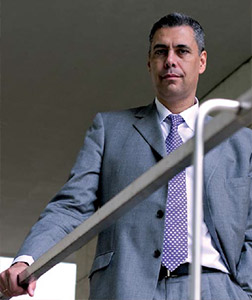
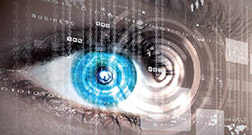

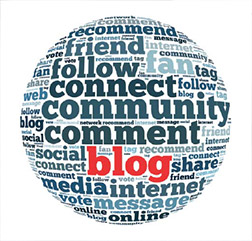
“The burgeoning companies would be those with the best capabilities to manage clients information, without being intrusive”
The future of insurance and reinsurance is also bound up with the new society being shaped by IT Mobility and the communication and storage capabilities supplied by the web, the cloud and social networks open up new scenarios and potential advantages for business. Multi-channel distribution is already common in the industry and it is time to bring on new approaches to business and customer-company relations, with two-way interaction as a priority.
Life is now inconceivable without mobile information systems. How has technology evolved since you have been a lecturer?
The key change has been thinking about technology as a tool to do the same things, only better. In other words, companies and individuals use technology to do what they usually do but in a faster and more efficient way. Technology enables you to do things you never even imagined: keeping continuous contact with your clients, your employees, working from different places. There are many possibilities that did not previously exist. Technology allows doing different things, getting the best out of other things, thinking up other possibilities, interacting with people in different ways. Technology gives you tremendous capabilities for two-way interaction. Corporate communications have changed a great deal.
What do you expect of communication? I want what I receive to spark a reaction in me, I want to comment on it, share it, make it go viral
The world the younger generations live in is inconceivable without IT. Will everything revolve around technology in the future?
Yes. The question is simply finding a value proposition. Nobody is inept or incapable of using technology. There are no barriers, it is not complicated. As technology evolves, its complexity and learning curves diminish very quickly. Should someone say “this is not for me”, it is simply because a value proposition has not been found. Once you have located one, everything is different. To explain this concept, I usually tell the example of traditional fishermen in Galicia, in northwestern Spain. They are basically against any complex technology, but when they realised that a mobile phone enabled them to keep permanently in touch, in the event of an emergency, to keep abreast of market prices, and to know which type of fish is being unloaded in larger volumes, then they began to appreciate the benefits. Today, when an executive is looking to change jobs, prospective employers study their “cloud metric”, which provide a measure of their online influence. Not whether you are on Twitter or Facebook but how many people actually follow you and look at your account. For instance, when you post something on Twitter, how many people retweet it and so on. This indicates a person’s online influence. Many companies look for candidates with a strong online influence when they want to recruit an executive.
First hand perspective
Why did you decide to specialise in information systems and technologies?
You could say I had access to technology very early on. When I was in my second year at university in 1986, my father won the lottery and offered to buy me whatever I chose. I asked for a car but he bought me a computer. I began to see what it could do and I enjoyed it, so I taught myself to use it. I used to do all my class assignments on a word processor, so they looked much better. I started using spreadsheets for genetics work. When I started the IE Business School Master, I already knew all the necessary computing, so I helped the teacher and the other students when they could not keep up. That same lecturer asked me to stay here and teach, which had never really crossed my mind. He said I could explain complicated things simply. The idea also seemed attractive because this is different from a university. People are highly motivated here - they are keen to learn. You feel they want more.

The blog as core element
You are a professional of the Internet and social networks. How influential is your blog? You have mentioned in the past that it is part of your work.
Blogging is not my real job. Teaching is my job and my research involves reading a large amount of information every day. The extra cost of gathering all this -which I would have to do anyway- and adapting it to blog format, is okay. Actually, what I do is prepare my lectures, or do my research, or look up information for other purposes. For a manager, what is the cost of writing about interesting subjects connected with their work? Not that much. It is a very low cost. But a blog cannot be an end in itself. It must be a tool that helps you achieve other things.
Any competent professional should consider starting a blog. But have social networks not taken over that function to some extent?
Blogs are essential. It is a mistake to feed your networks and not have a blog. My presence on the networks is made up of things I have posted on my blog. I use the networks to spread them, give them an audience, make sure they circulate, and receive feedback. If some people want to read me on Linkedin, that is fine, but what they are reading is on the blog. This means I own the link, the core element. Because I control the core element, all traffic reverts to my blog, which will not be affected if Facebook suddenly decides to change its policy or Linkedin or any other network ceases to exist.
Don’t you get the feeling that blogging is like writing on snow?
Quite the opposite. That is the case with social networks half an hour later, it is gone. It is still there, it does not just vanish. You can go back to it, find it, quote it, link to it. But very few people read a tweet that is an hour old.
But if someone wants to analyse you, they can.
Exactly, that is why it is not snow. It remains. In this sense, a blog has a far longer lifespan than social networks, where posts are extremely shortlived. They move with you. Your time span is the three preceding hours and the two days following, no more. A blog, on the other hand, remains. It is indexed and you can control it. That is why your blog is the core of your information ecosystem.
Social networks are like writing on snow. Very few people read a tweet that is an hour old. A blog is still there, it does not just vanish. You can go back to it, find it, quote it, link to it
What is your opinion on social networks?
They create an environment where humanism and the value of the individual prevail. What we have is a new interpretation of classical humanism, where the individual is enhanced. Now the individual is at the centre of relations with the people around him or her, the people he or she communicates with. Take me, a simple lecturer at a business school. The possibility of inviting the chairman of a bank to have lunch used to be pretty remote. Now, I can do that.
Are we moving towards a world pervaded by personal management, both of business and of technology and influence?
We are only as important as our persona is. Today you are here, tomorrow you are there and the next day you are somewhere else. Nowadays, the logo on your business card is not as relevant as what people see when they look up your name. How do HR managers go about recruiting in the modern world? They google the names of the applicants. That is where they get information, the CV is merely a reference. If you say you have done a certain course, a Google search with the name of the university should bring up something relevant. More and more we are what the web, which is in everything we do, says about us.
In Spain, social networks like Twitter, Facebook and Linkedin are very successful, and the same goes for others like Tuenti. But others are not quite managing to take off. Is there not too much disparity between the different networks? Could the future lie in each company creating a network of its own for its employees, clients and so on, in line with its corporate interests?
I do not think so. It is not usually a good idea to reinvent the wheel. The main thing you need in a network is the network effect, i.e. it has to include the people you want to contact. This is the main entry barrier. It is highly unlikely that a user will think it worthwhile to be on a network and feed the network just to communicate with you. People are on a network and feed a network for a broader purpose, which is why networks have become increasingly horizontal. The network that has come to prevail in the professional world is Linkedin.
Do you think Linkedin will finally find a way to fund itself?
What does a company need? People who link to those contents, comment on them and share them. We want the content to become viral. Social networks are the channel that enables you to achieve all that
It is one of the most profitable companies. It is the one that is doing best, precisely because its business model is based on people paying when they are looking for work so that they can contact anyone. Additionally, there are companies that pay to recruit people on Linkedin. There is also advertising, which can be segmented quite efficiently by geographical area.
Facebook is the general-purpose horizontal network par excellence. I believe networks are what you put in them. Google+ does not seem to be going too strong in Spain, but it is the only network where I have half a million followers from different places. If you feed the networks, the networks bring back what you give them. The Internet is like the sea: you throw good things in it and it brings good things, you throw rubbish and it brings you rubbish. If you share contents on a network like Google+ and find that people comment on them, provided that you do not just abandon the conversation but look after it now and then, you will realise that investing more gives you more in return. I am absolutely fascinated by Google+. There are days when some of my entries have more comments on Google+ than on the blog itself. Now I am starting to play around with the communities Google has just launched. They are really interesting.
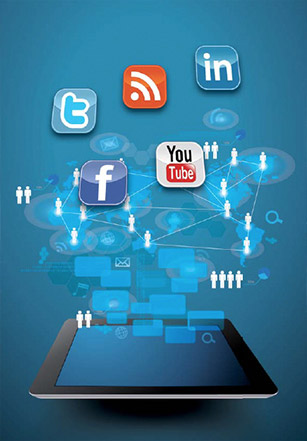
Insurance and Social Networks
Many companies have lagged behind in terms of their web presence and use of the Internet. This is clearly the case in the Spanish insurance industry, which is beginning to need community managers to deal with the exchanges taking place on social networks. Is this a profession with a bright future?
The role of the community manager has an enormous potential. Many of the areas we currently view as customer service, including call centres and numerous aspects of corporate communications, will be associated with a role very similar to today’s community managers. In the modern world, a communications manager is not someone who issues press releases. The format itself is outdated. Today’s corporate communications managers constantly monitor key influencers, who tend to disappear as fast as they spring up. The old list of journalists you used to send your press releases to is no good now.
How does the insurance industry fit into this evolving environment?
Insurance is traditionally quite a conservative industry, but there is already talk of social network strategies. Many companies have realised it is important. There has been talk about being on the social networks but I do not think it is a good idea to focus on that alone. It is not just a matter of being there, you need to devise a strategy for online presence, and that means creating content. How do you create those contents? How do you go about maximising their impact using the social networks? Where? How? Through which channels? And so on. All this involves more than simply having a Facebook page. There is an approach that is not right. Many companies are falling prey to paralysis by analysis, which means repeatedly analysing to such an extent that they end up not doing anything. That is where I see a good deal of lost profit. Which companies have more business? Those which are most active online. Why is online selling associated with cheap selling? It is senseless! The people who buy online are not the people who buy cheapest. In fact, as online buyers, we have a higher purchasing power and are able to make more informed buying decisions. So, why is online selling regarded as a low-cost channel or a channel solely aimed at buyers? There are many other possibilities. If I improve the ways in which I can interact with my customers, ensuring there is a much more direct line between them and me, this enables me to do several things: I can give them much more support, I can set up a direct channel with or without intermediaries depending on what I think is best, and so forth. There are endless possibilities beyond “I am on the social networks”.
One of the hardest tasks today is gathering information on the Internet and interacting on social networks all day. On the other hand, with all the technology available it seems anyone can do a journalist’s job.
Nowadays, many of the answers journalists look for are just one click away. This does not mean it is a good idea for journalists to spend all day clicking away. They need to be on the ground, interviewing people and so on. But there is a lot of information out there and all you need is a certain degree of skill. A commentator is not a journalist. There are many commentators, people who write a column from a secure position. And then there is something that is quite different: writing that is properly worked through, which requires looking things up, doing research, appraising the quality of your information, checking. All this is journalist work, which I do not do. I have worked with journalists in the past and I have a lot of journalist friends. I try to make their work as easy as possible.
Spanish language has a strong presence and very large new natural markets, some of them showing tremendous growth. Latin America is an extremely attractive market
How do you think it will all evolve? Will social networks provide a springboard for business in the future? Have they become that already?
If you are not on social networks, you are missing out on a valuable resource. Many people who make purchasing decisions on your product get their information from the Internet. So what is it that really determines whether your information comes across on the web? The number of incoming links. Google gauges you and ranks you primarily according to the number of incoming links you have, not visits or what you buy or do not buy. It is the number of people who link to your site. I have been producing information that people link to for the past ten years. Therefore, there are many roads pointing to my contents and lots of Google-indexed links that make me easy to find. Take a company that produces contents about its products, its promotions, how it interacts, its approach, its value proposition and so on. If all those contents are tucked away somewhere on their website without any links to them, they are not much use. So what do we need? People who link to those contents, comment on them and share them. We want the content to become viral. Social networks are the channel that enables you to achieve all that.
Towards a new communication society
What kind of communication society is emerging?
A society where everything is permanently in contact, in every sense. In the insurance industry there used to be companies that had contact with the customer once, when they signed their policy. In the case of life insurance, you did not see the customer, but his or her heirs. Today, people are looking to have a much more ongoing relationship, where they can ask a lot more questions about all manner of things they are unsure about. What I want is my insurance company or my credit card company to automatically notice I am, say, at an airport terminal when I check in. Would you like to buy an insurance policy for that ticket to make sure you are protected? I would probably go for that product. Companies today should be analysed in terms of how much information their operation can generate and how efficiently they can use that information while avoiding invasiveness and keeping a respectful distance. How much information can an insurance company generate about its customers? Maybe at the time of signing the policy it can generate a fair amount but after that, is there any further interaction?
Perhaps there is not any further interaction, but they do have a lot more information than banks do. If a given customer has policies for health, life and home insurance, we can generate their profile.
That is something you need to capitalise on. For instance, in the past few months I have adopted a healthier lifestyle. I want my insurance company to ask me for the relevant information to verify that my habits are much healthier now so that my risk profile can be updated and I can receive offers for other products. Maybe I can get a reduction on my health insurance and be offered policies aimed at people who do sports more often.
How would you call the kind of society we are moving towards?
The key concept here is two-way interaction. Nowadays, TV advertising does not prompt a reaction in the user. There is no feedback. Plus, the third time it is shown, it says nothing new, so you are wasting money on branding that could probably be done more efficiently in a different way. What do you expect of communication? I want what I receive to spark a reaction in me, I want to comment on it, share it, make it go viral and so on. I want to engage with you if I find something interesting. When companies finally embrace two-way interaction and begin to learn how to use it, they realise it applies to everything, even politics.
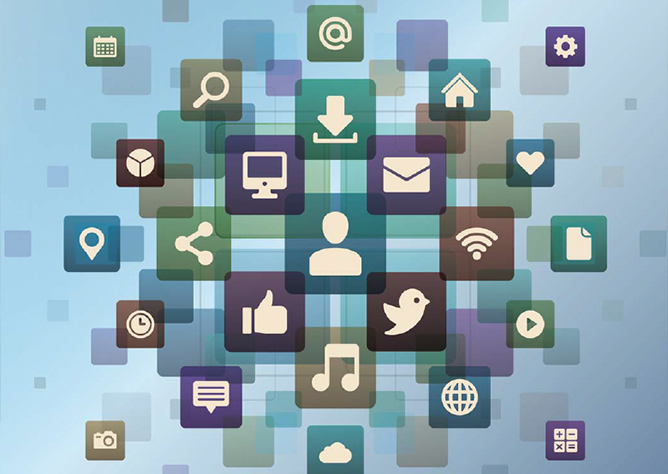
How significant is a language like Spanish on the Internet?
Quite significant. It has a strong presence and very large new natural markets, some of them showing tremendous growth. Latin America is an extremely attractive market. Ultimately, it is all a matter of deciding where your market is and how you are going to reach it. I do not post any entries in English, even though I am bilingual. I do not blog in English because I have an established audience in Spanish and blogging in English would simply amount to translating myself. Going beyond translation and reinterpreting your own writing means not just a little more work but doubling your effort, which is not worthwhile. But in the end, what you have to consider, as a business manager, is where your clients are. If this is where they are, you will have to relate to them however best fits their needs.
When companies finally embrace two-way interaction and begin to learn how to use it, they realise it applies to everything, even politics
If you had to name a few burgeoning industries for the next five years, which would they be?
The companies with the brightest prospects are those with the best capabilities to manage information, to obtain information from their clients and use it without being intrusive. Any intangibles- and information-based business has good prospects. Others do not have it so easy. For instance, a company whose business is preventing others from accessing information will find a great deal more difficulties. A record company or a publisher will struggle. If you are selling physical media, these sometimes change. Some of them are even no longer used. But if you manage information, you have excellent business prospects.



